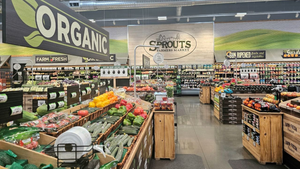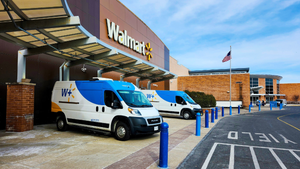UFCW: Over 11,500 grocery workers affected in first 100 days of pandemicUFCW: Over 11,500 grocery workers affected in first 100 days of pandemic
At least 82 grocery employee members have died from virus, says union
June 26, 2020

United Food and Commercial Workers International (UFCW) said at least 82 grocery store workers have died from COVID-19 and 11,507 have been infected or exposed to the virus in the first 100 days of the outbreak.
The nation’s largest private sector union, UFCW represents 1.3 million employees in grocery, meatpacking, food processing, retail, health care and other industries in the United States and Canada. The Washington, D.C.-based union said in a press conference yesterday that, among its membership, 238 workers have died from coronavirus in the 100 days since the pandemic started, while almost 29,000 have been infected or exposed.
“With our country now 100 days into the COVID-19 pandemic, America’s frontline workers still face many of the same dangers they faced on day one. In grocery stores, meatpacking plants and health care facilities, our country’s frontline workers are still getting sick and dying,” UFCW International President Marc Perrone said in remarks at the conference. “It’s high time for America’s CEOs and elected leaders to pull their heads out of the sand and take the strong action needed to protect these brave workers and the communities they serve.”

In May, Walmart announced plans to pay out another cash bonus for all U.S. full- and part-time hourly associates for their extra efforts during the pandemic.
In grocery stores during April — when incidence of the virus peaked in many areas of the country — 46 UFCW members died from COVID-19, marking that industry segment’s highest single-month total during the pandemic, UFCW reported. Grocery’s biggest overall spike in the spread of the coronavirus came in May, when 5,901 new workers were infected or exposed, the union said.
At meatpacking plants, at least 65 member workers died and 14,214 were infected or exposed in the pandemic’s first 100 days, according to UFCW. New coronavirus cases (infected or exposed) hit a high mark of 8,632 workers in April, and deaths from the virus peaked at 38 in May.
Meanwhile, food processing facilities had at least 28 worker deaths from COVID-19 and 3,474 workers infected or exposed to the virus among UFCW members during the 100-day period, the union said. April was the peak month thus far, as 19 food processing workers died and 2,107 were infected or exposed.
UFCW noted that health care facilities, where it represents 60,000-plus workers, have been on the front lines from the start of the outbreak. The union said it has confirmed at least 21 health worker deaths and 11,478 infected or exposed in the pandemic’s initial 100 days. Thirteen health workers died from the virus in April, and 8,554 were infected or exposed in May.
“American workers simply cannot survive with the current patchwork of safety measures taken by only a fraction of companies and states with millions still unprotected and vulnerable. We need real enforcement of the highest safety standards,” Perrone said.

Plexiglass shields at checkout are among the coronavirus protections that Amazon's Whole Foods Market implemented to safeguard staff and shoppers.
In the press event, Perrone criticized large employers — citing Amazon, Walmart and Kroger — for “still keeping us in the dark” in terms of the total number of their employees who have died from or been infected with COVID-19. “Simply put, it is impossible to hold the government or corporate America accountable when they hide the true impact of this outbreak,” he said.
Since the onset of the pandemic, however, those companies have disclosed and/or confirmed media reports of positive coronavirus cases and/or deaths among employees at various facilities around the country. Walmart, Amazon and Kroger also have provided regular updates on their COVID-19 response efforts, including protections, compensation and benefits for workers. In April, Kroger joined with UFCW in urging federal and state government to classify grocery store workers as emergency first responders during the health crisis.
But with coronavirus cases rising in much of the United States, Perrone called for three national initiatives to safeguard frontline workers. They include reinstating hazard pay and setting a $15 hourly wage for all frontline workers, establishing a public mask mandate in all 50 states, and forming a new national public registry to track COVID-19 infections in frontline workers.
UFCW said the registry would require companies with over 1,000 employees to submit monthly reports on worker deaths, infections and exposure.
According to Perrone, the Trump administration has failed to enforce clear Occupational Safety and Health Administration (OSHA) standards, which has hampered COVID-19 safety measures for frontline employees.
“This is exactly why so many frontline workers have become exposed to this virus,” he said. “There is something fundamentally wrong when the White House and Congress are spending more time trying to let companies off the hook for the health of their workers. Americans deserve better.”
Through Friday morning, 33 states reported at least double-digit increases — including nine states with triple-digit gains — in new daily coronavirus cases, according to NPR. The highest number of new cases per day were in California (4,861 cases, 60% versus two weeks ago), Texas (4,757, 175%), Florida (4,013, 216%), Arizona (2,834, 137%), Georgia (1,455, 99%), North Carolina (1,329, 24%) and South Carolina (1,070, 86%). NPR’s report is based on data from Johns Hopkins University.
For our most up-to-date coverage, visit the coronavirus homepage.
About the Author
You May Also Like


.webp?width=300&auto=webp&quality=80&disable=upscale)



